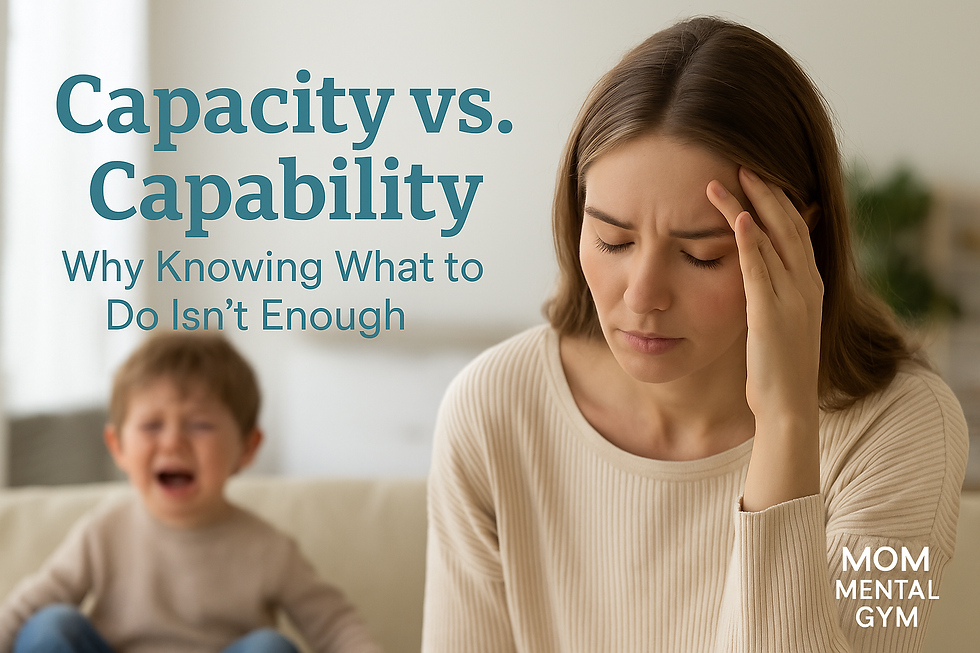Strengthening Parent-Child Bonds: The Power of Self-Care in Parenting
- Oct 18, 2023
- 3 min read
Updated: Oct 19, 2023
In the beautiful chaos of parenting, the well-being of children often takes precedence, often leaving little room for the self-care of parents. However, the Pyramid of Parenting, an insightful concept originating from "The Anatomy of Peace" by the Arbinger Institute, illuminates the critical significance of parents prioritizing their own emotional, mental, and physical well-being. By emphasizing the nurturing of the self, this pyramid encourages parents to build a strong foundation within themselves, fostering healthier and more sustainable relationships with their children.

Understanding the Pyramid of Parenting:
At the base of the Pyramid of Parenting lies the cornerstone of self-work. Acknowledging the profound impact of their emotional and mental health on the family, parents realize that self-care is not selfish but a fundamental necessity. Just as a building needs a sturdy foundation, effective parenting requires a basis of personal emotional well-being. Engaging in self-reflection, cultivating self-compassion, and practicing emotional regulation allows parents to model healthy behaviors for their children, fostering an environment of emotional stability and understanding.
Connecting Before Correcting:
The Pyramid of Parenting advocates for building a strong emotional connection with children before focusing on correction. This emphasis on understanding and connection over judgment and blame creates a bridge for open communication, trust, and mutual respect. When children feel heard and understood, they become more receptive to guidance and discipline, fostering a secure and nurturing parent-child relationship rooted in empathy and understanding.
Practicing Skills Within the Family:
The next level of the Pyramid of Parenting emphasizes the importance of applying the skills learned through self-work within the family dynamic. By implementing effective communication, conflict resolution, and empathy-building techniques, parents create an emotionally safe environment that promotes growth and development for all family members. This approach allows children to learn how to navigate their emotions, communicate effectively, and develop a deep sense of empathy and understanding.
Fostering Open Dialogue and Emotional Expression:
Additionally, the Pyramid of Parenting highlights the value of creating a safe space for open dialogue and emotional expression within the family. By encouraging children to express their thoughts and feelings without fear of judgment, parents facilitate the development of self-awareness and emotional intelligence. This practice strengthens the parent-child bond and equips children with the tools needed to face life's challenges with resilience and confidence.
Emily's Journey:
Before delving into the principles of the Pyramid of Parenting, Emily, a devoted single mother, often found herself overwhelmed and emotionally drained. Juggling a demanding job and the responsibilities of parenting, she struggled to find the balance between work and family. Her relationship with her teenage daughter, Lily, had been strained, characterized by frequent misunderstandings and arguments over trivial matters. Emily's exhaustion often led to impatience, causing communication breakdowns and further distancing her from Lily.
However, upon recognizing the significance of self-care and emotional well-being, Emily began to prioritize her own needs. Implementing small changes in her daily routine, such as setting aside time for personal reflection and engaging in stress-relieving activities, she gradually felt more centered and emotionally equipped to handle the challenges of parenting. Through this journey of self-discovery, Emily learned the importance of self-compassion and its profound impact on her relationship with Lily.
As Emily integrated the practices of self-care and emotional well-being into her daily life, the atmosphere at home began to shift. Her newfound emotional resilience allowed her to approach conflicts with Lily from a place of patience and understanding, creating a safe space for open communication and mutual respect. By actively listening to Lily's concerns and perspectives without judgment, Emily nurtured a deeper sense of trust and connection with her daughter. This shift in their relationship fostered an environment where Lily felt seen and understood, leading to a more harmonious and nurturing parent-child bond.
Conclusion:
The Pyramid of Parenting serves as a gentle reminder that the well-being of parents directly influences the dynamics within the family unit. By prioritizing their emotional and mental health, parents lay a robust foundation that fosters a nurturing and supportive environment for their children to thrive. Emily's transformative journey highlights the profound impact of self-care and emotional well-being on the parent-child relationship. It emphasizes the significance of taking the time to nurture oneself, allowing parents to cultivate healthier, more empathetic connections with their children, thus creating a more harmonious and resilient family dynamic. As parents continue to prioritize their self-care, they contribute to creating a loving and compassionate environment that supports their children's holistic development and growth.
Source: The Arbinger Institute. (2015). The anatomy of peace: How to resolve the heart of conflict (2nd edition). Berrett-Koehler Publishers.



Comments